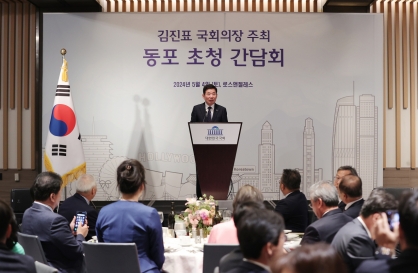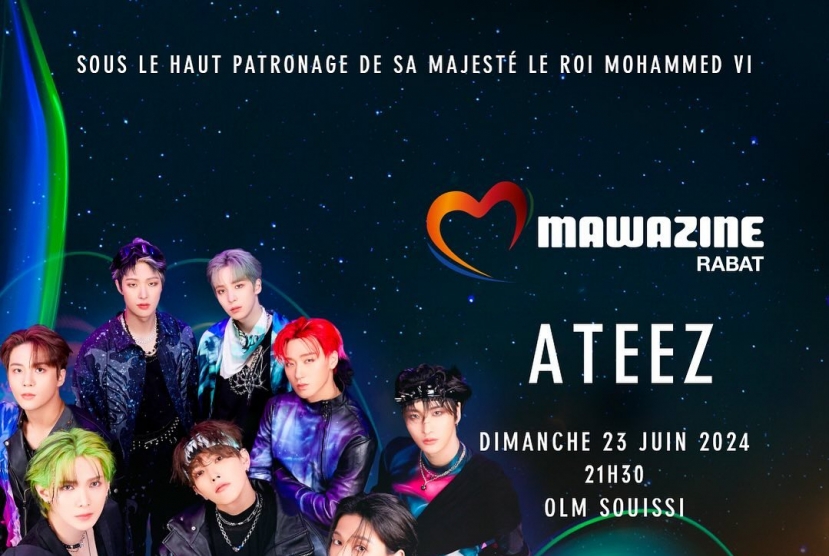Soul-searching through humanities
Popularity of the liberal arts drives people and businesses to return to classic books and attend related classes
By Korea HeraldPublished : May 24, 2013 - 21:21
Every Tuesday, a group of corporate executives and high-ranking government officials attend a lecture on humanities at Seoul National University. The program, named “Ad Fontes,” a Latin expression meaning “to the sources,” challenges the students in their 50s and 60s with fundamental questions about life.
The students have to tackle the fundamental issues surrounding historic figures and influential books while absorbing knowledge from a diverse spectrum of studies from Oriental philosophy to literature.
The first hour of the lecture on May 21 was led by Kim Jin-yup, an aesthetics professor at SNU, who explained how art can heal psychological trauma. The professor introduced Sigmund Freud’s psychoanalysis of two artworks by Leonardo da Vinci, “The Mona Lisa” and “Virgin and Child with St. Anne,” in connection with the artist’s childhood memories.
The students have to tackle the fundamental issues surrounding historic figures and influential books while absorbing knowledge from a diverse spectrum of studies from Oriental philosophy to literature.
The first hour of the lecture on May 21 was led by Kim Jin-yup, an aesthetics professor at SNU, who explained how art can heal psychological trauma. The professor introduced Sigmund Freud’s psychoanalysis of two artworks by Leonardo da Vinci, “The Mona Lisa” and “Virgin and Child with St. Anne,” in connection with the artist’s childhood memories.
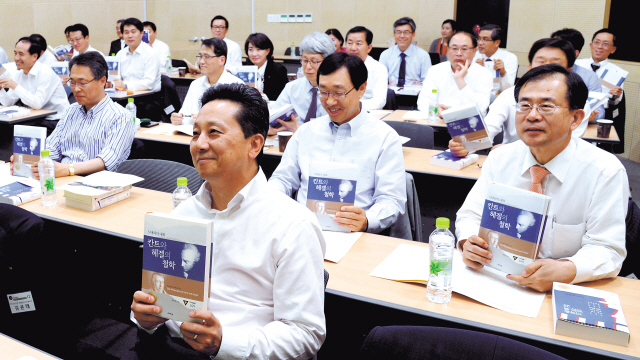
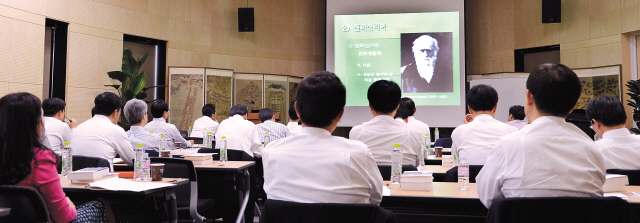
Not a single phone call was made during the lecture. Absentees are rare.
“Many of us have been living in a harsh working environment and fierce competition. But now I enjoy emotional well-being and regain my composure by learning about humanities, which have long been forgotten in my life,” said Kim Young-chul, senior executive vice president of Hana Bank and one of the 43 participants of the program.
Bae Young-soo, dean of the College of Humanities at SNU, said he used to be skeptical about opening such a course. The popularity of books and television shows on humanities also seemed to be a passing fad, he said.
“I think this trend may signify a huge turning point in society as I found out that many students attending this course are eager to resolve serious concerns through self-reflection as they dig into the study of humanities.”
However, the dean said that the popularity cannot be considered a revival of broader humanities in Korea. “I would rather say it is a rebirth of public interest in the humanities.”
In addition to the AFP course, a flood of lectures organized by public libraries and local governments are generating buzz.
The Seongnam City Government, for instance, launched a project called “Ji Ho Rak Humanity Concert” as part of its life-long learning programs. Under the project, residents are given easy access to humanities materials intermixed with various elements like music or talk shows.
Seongnam’s Life-long Learning Team said they are trying to dispel the stereotypical image that humanities programs are boring. Especially, the turnout rate among children is higher as the programs focus on families.
Civic groups have also joined the movement to spur interest in the humanities. A civic body named “Humanitas Cafe” was launched in January last year, allowing its members to invite lecturers and hold seminars customized for their interest and needs.
“To continue the recent interest in humanities, citizens take the central role in the education, not the scholars,” Lee Gwan-ho who represents the organization said.
In Korea, one of the most wired nations in the world, online lectures and podcasts play a crucial part in spreading humanities further.
Choi Jin-ki, an e-learning instructor who teaches social science for high school students at ETOOS, launched an online lecture series on the history of war, architecture and other various topics, and released part of it via podcast for free. And “Choi Jin-ki’s Special Lectures on Humanities” has caught on with young people, making Apple’s top 10 podcasts list on the South Korean market.
He said that he perceived there is a stereotype that humanities is difficult and boring. On the contrary, Choi discovered a great thirst for the discipline in Korea.
“When society becomes a heartless place due to many reasons including the economic slowdown, people tend to ask themselves fundamental questions about their lives and search for answers. The popularity of self-help books during the 2008 financial crisis is one such example,” he said in an interview with The Korea Herald.
In line with President Park Geun-hye government’s “creative economy” drive that focuses on promoting science and innovation, conglomerates try to find the source for creativity not only from technology but also from sensibility based on the study of humanities.
Samsung Group took an initiative to invite liberal arts graduates to join its workforce by opening Samsung Convergence Software Academy. The six-month intensive training course is designed to nurture software engineers capable of integrating critical thinking skills with cutting-edge technology.
“When human-centered technology based on emotions becomes important in the future, a generalist, who understands technologies with grounding in liberal arts, will play a crucial role,” an official of Samsung who lead the SCSA said.
SK C&C, IT service provider, worked out a different strategy to educate their employees. The firm holds a series of talks under the theme of “The story about ‘The Phantom of the Opera’” hosted by Chung Chul-khil, the company’s CEO and president, to inspire the employees to have a creative and innovative mindset.
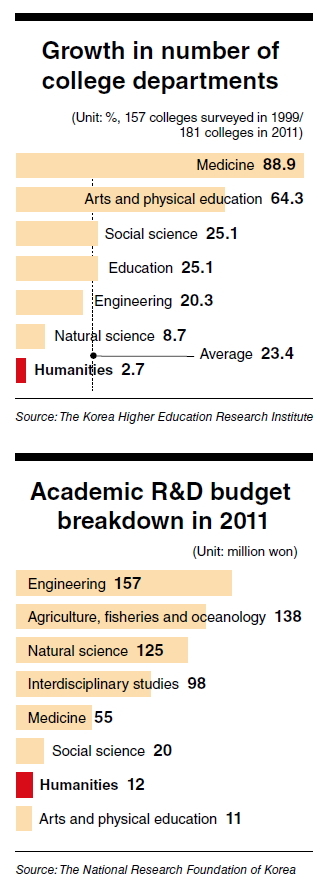
In contrast, humanities departments at colleges confront unprecedented challenges. The decline of humanities was illustrated in the minimal number of related departments opened at universities over a 12-year period.
There was just a 2.7 percent increase in the number of humanities departments between 1999 and 2011, compared to an average 23.4 percent for all disciplines, according to the Korea Higher Education Research Institute.
“The result shows that disciplines dealing with fundamental studies and unpopular faculties have been abolished or merged due to difficulties seeking jobs,” a researcher at the institute said.
Universities defended the weakened role of humanities as inevitable as governments allocate more funds to departments with higher employment rates for graduates.
According to statistics from the National Research Foundation of Korea, humanities ranked seventh out of eight university disciplines for allocation of research funds per capita for research directors.
Engineering received the highest per capita grants with 157 million won ($140,000), more than 12 times humanities’ 12.5 million won. The three departments earmarked the most funding were from natural sciences, engineering and medicine.
“Fewer students want to choose humanities as their major and more people tend to approach humanities to acquire culture outside and even inside of colleges,” said Yang Jeong-mo, head of humanities and social sciences team at the National Research Foundation of Korea.
Despite the contrasting developments in academia and the corporate sector, SNU’s Bae Young-soo said he’s seeing a sign of hope.
“Trying to seek answers in humanities by throwing more questions and rumination is a healthy way to tackle the problems we are facing,” he said.
By Park Han-na (hnpark@heraldcorp.com)
Intern reporter Lee Ah-ran (tomato08@heraldcorp.com) contributed to this article. ― Ed
-
Articles by Korea Herald



![[AtoZ Korean Mind] Does your job define who you are? Should it?](http://res.heraldm.com/phpwas/restmb_idxmake.php?idx=644&simg=/content/image/2024/05/06/20240506050099_0.jpg&u=)







